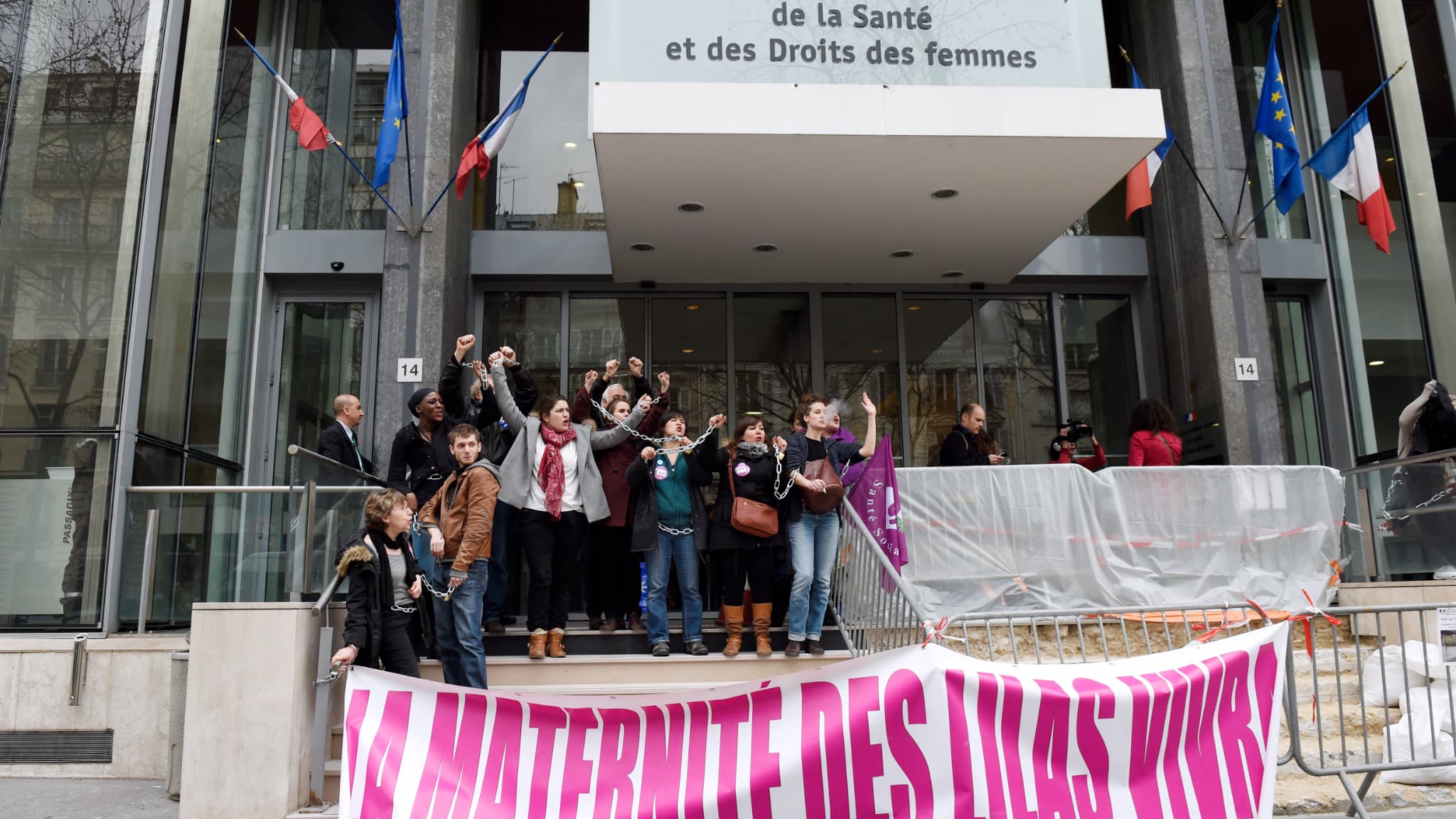“It’s like a family.” It was at the maternity hospital in Lilas (Seine-Saint-Denis) where Samira gave birth to a girl, who is now 5 years old. A place that, beyond the happy event, had a profound impact on her, like several generations of women before her.
Located between two apartment buildings and recognizable by its dark wooden façade, the maternity hospital permanently closes its doors this Friday, October 31.
Created in 1964 by Countess Colette de Charnières, the establishment has been known for more than six decades in the Ile-de-France for its exceptional perinatal support focused on physiological birth. A pioneer in the emancipation of women, the Lilas maternity hospital has also practiced voluntary interruption of pregnancy (abortion) since the 1960s.
With this, the closure of the establishment takes away thousands of intimate memories. Some have experienced their greatest joys in Lilas, others pain, and everyone talks about it with great emotion.
“There I found true listening”
“It seems like yesterday,” Samira still remembers. The young woman, who is now 37 years old, gave birth at the Lilas maternity hospital in 2020. At that time, Samira had only been in France for a short time and followed the advice of a friend who worked as a security guard at the entrance of the establishment.
“It tells me that everyone there is friendly, that it is better than other places.” So Samira decides to go there, “to see.” “From the first visit I felt good. This feeling never left me throughout the pregnancy. It’s like being at home.”
Throughout the weeks and medical follow-up leading up to delivery, you slowly build relationships with the healthcare team. “There I found real listening and shared very good times with the midwives and nurses. If I had a question, a fear or anything, I knew I could ask them without them getting angry with me, even in the middle of the night. They don’t make an effort when they come to help. I was very surprised because we know all the difficulties of caregivers.”
And there have been increasing difficulties since the 2010s. The Lilas maternity hospital, which has 19 rooms and four delivery rooms, has had to face significant financial difficulties. But on site, the teams always fought to the point of delaying a closure that had now become inevitable.
“It is true that five years ago we saw that the equipment was aging, but we do not go to Lilas for the facilities or the equipment, we go there for the rest,” says Samira.
Like the other patients who passed through the maternity ward, Samira was approached and informally approached by staff members. A specific exception to the establishment where a supposedly “very sixty-eight” atmosphere reigns.
“Painless childbirth”
Evelyne’s story goes back more than 40 years, but it has had the same impact on her. In 1982 she was hospitalized in Lilas. Your baby, who is in no hurry to be born, must be monitored 24 hours a day by health teams. “I was a single mother, a marginal hippie, and my 15-year-old daughter was with me at Les Lilas. It was really crazy because I was there so long that I even played cards with the interns. One night, with my roommate, they gave us salmon,” confesses this resident of Ile-de-France, who is now 79 years old, with amusement.
With his oldest son, he participates in fractional breathing classes taught on site. At Les Lilas, women learn the “painless childbirth” method or “Lamaze method” (named after the doctor who invented it). A wish from the founder of the place, Colette de Charnières. A woman who wanted to leave others a place where all attention is focused on the body, calmly and sweetly.
“I practiced exercises in which I had to touch my bones and my muscles. I had the possibility of putting myself in the position I wanted and that was the day my son was born,” recalls Évelyne.
The year of her hospitalization, Evelyne witnessed the installation of a “bathtub” in Les Lilacs in which women could relieve the pain of contractions thanks to the water. “In 1980, it was a bit innovative. There was clearly no such thing, and we even heard criticism from outside, but it was very comforting to know that, if you wanted, you could give birth squatting or with your head down.”
“I saw everything about my cesarean section thanks to a mirror that was installed above me during the procedure. (…) They also asked me if I wanted music to play in the background, I didn’t want to, but it seemed crazy to me,” confesses Évelyne.
A few years later, it was her daughter’s turn to give birth to her son at the Lilas maternity hospital. “A no-brainer” in the family. “I felt nostalgic when I returned there in 1994 to see my granddaughter,” explains Évelyne with great emotion, “I saw friends there again and nothing, or almost nothing, had changed.”
Encourage the father to take his place.
When Jean-Michel arrived at 12 rue du Coq-Français in 1989, he only believed in “bad experiences” when it came to gynecological care. With his wife Esther, they have just left the office of an “unscrupulous” doctor who compared the pregnant woman to a “workshop” and the father to a “workshop mechanic.” Furious, they went to Lilas’ maternity hospital, famous in the Paris region for its open mentality.
“In fact, we started from nothing. It was catastrophic in the other structures and I, as a father, also wanted to be able to assume my role and support my wife,” explains Jean-Michel.
This is followed by haptonomy training that aims to bring parents closer to their baby, even before birth. This involves, among other things, talking, listening to soft music or even skin to skin. Upon contacting the midwives, Jean-Michel reveals himself. Accompany Esther in every lesson, in every exam. “I was part of a team, I had responsibilities and they made me understand them delicately,” explains the sixty-year-old.
Allow women to have safe abortions
For Esther, the experience at Les Lilas was “very reassuring.” Maybe that’s why he also returned eleven years later. “This time I made the decision to abort,” she confesses without taboo. The Lilas maternity hospital also housed a center dedicated to voluntary termination of pregnancy (VIG) and sexual health. A place where it was possible to seek help quickly and argue without fear of being judged.
“It is not easy to have an abortion. The people there were welcoming and attentive. There was no coldness,” adds Esther, 69 years old.
Even before the Veil Law was passed in 1975, the Lilas maternity hospital allowed many women to have abortions. When it started in the 1960s, the methods could be rudimentary. Over time, some teams have specialized and the sexual health center has become a reference in the Ile-de-France.
The establishment was even targeted by “anti-abortion commandos” several times in the 1990s; Shocking episodes during which activists tried to degrade the place and attack the women involved. “But we felt safe,” continues Esther, very moved. On each occasion, motherhood has risen up and made the emancipation of women its main objective.
Samira, Évelyne, Esther, Jean-Michel and many others. In unison, everyone expresses their deep sadness at the idea that Lilas’ maternity hospital will permanently close its doors this Friday. The “lilac babies”, as they themselves say, will remain united for life. In the future, the facility should house a new health center dedicated to women.
Throughout this week, events were organized in the maternity ward. A silent march was held on Thursday evening near the establishment in the presence of the mayor (PS) of Lilas, Lionel Benharous.
He also says his heart is heavy. “My three children were born there, but I am also a resident of the city. Motherhood is at the center of my memories as a father, citizen and mayor. The women will have to go somewhere else, it is a shame for everyone.”
Source: BFM TV



